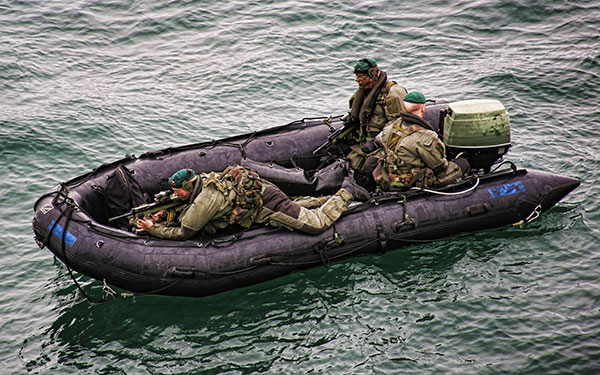Britain’s premier maritime commando force is sailing toward the Strait of Hormuz for an exercise amid an international crisis triggered by Iranian aggression against two oil tankers last week.
Royal Marines commandos from 42 Commando will be conducting visit, board, search and seizure drills, among other tasks, in close proximity to where the two tankers were severely damaged by Iranian limpet mines.
Both the Ministry of Defense and 42 Commando denied the deployment is in response to Iranian aggression. In a rather unusual move, 42 Commando even made a statement through its Twitter account.
“Unglamorous as it may be, yes, it is,” said the statement referring to the fact that their deployment is pre-planned, adding, “We know because we’ve done all of the sodding pre-planning!”
Iran, meanwhile, continues to deny any involvement in the incident. The Iranian government’s cheek was so large that it even complained to the British ambassador in Tehran for the statements of the British Foreign Secretary Jeremy Hunt who said during an interview with the BBC: “We have done our own intelligence assessment and the phrase we used is almost certain. We don’t believe anyone else could have done this.”
The U.S. Central Command (CENTCOM) even released video footage showing Iranian patrol boats approaching the damaged tankers and removing unexploded limpet mines from their damaged hulls. This blatant attempt to vanish the evidence notwithstanding, Tehran cries conspiracy.
British Defense Minister Tobias Ellwood said in an interview: “The Strait of Hormuz is an active international passage for oil and other commodities to come out and it’s important that they are free and are able to move, without the problems and challenges that we face.”
With just a two-mile-wide shipping lane, the Strait of Hormuz, which slithers between Oman and Iran, is the world’s most valuable oil sea lane and a strategic chokepoint. Approximately one-fifth of the world’s crude oil transits the Strait.
Meanwhile, U.S. Acting Secretary of Defense Patrick Shanahan authorized the deployment of 1,000 troops to the Middle East after a request by CENTCOM.
“The recent Iranian attacks validate the reliable, credible intelligence we have received on hostile behavior by Iranian forces & their proxy groups that threaten United States personnel & interests across the region,” said Shanahan in a Twitter statement. “The United States does not seek conflict with Iran. The action today is being taken to ensure the safety & welfare of our military personnel working throughout the region & to protect our national interests.”
Already have an account? Sign In
Two ways to continue to read this article.
Subscribe
$1.99
every 4 weeks
- Unlimited access to all articles
- Support independent journalism
- Ad-free reading experience
Subscribe Now
Recurring Monthly. Cancel Anytime.











COMMENTS